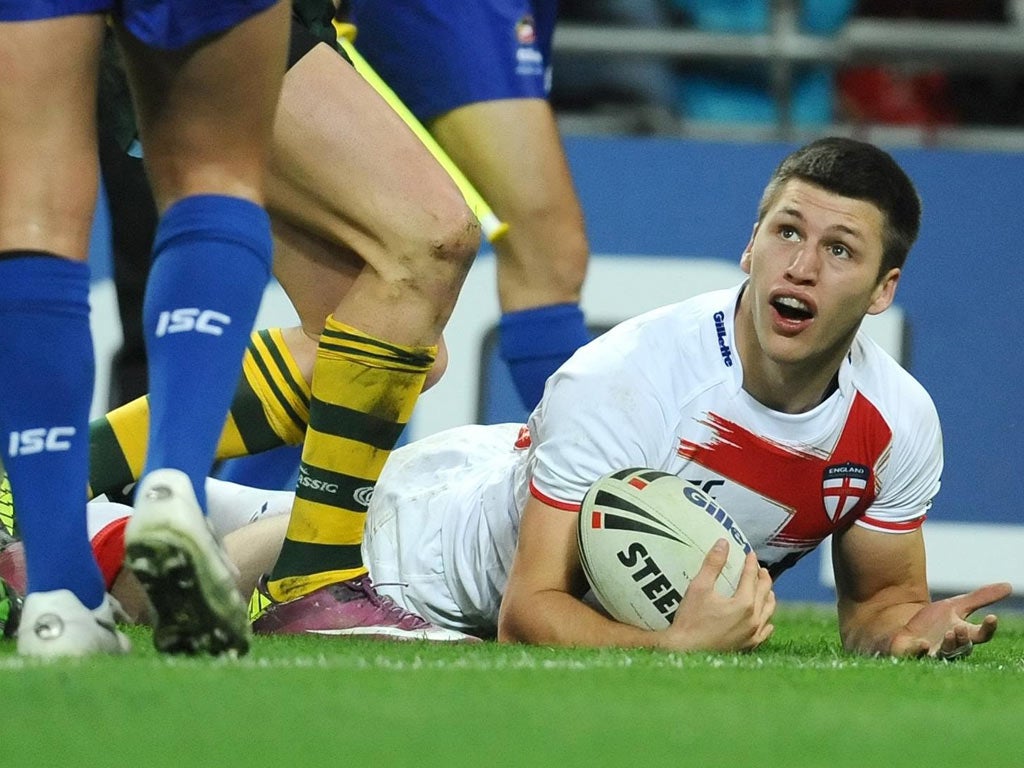Peacock's knee heads list of England woes
England 20 Australia 36

England have to beat New Zealand on Saturday to reach the final of the Gillette Four Nations and might have to do so without three of their most experienced forwards.
Jamie Peacock, James Graham and Gareth Ellis all ended a frustrating defeat at Wembley with injuries that could keep them out of the must-win match against the Kiwis.
Of the three, it is captain Peacock's knee that is causing the most concern and will require a scan. The other two hope to be fit after their backs seized up against Australia.
That was just part of England's misfortune on the day. Key try-scoring decisions went against them – clearly wrongly in the case of a Tom Briscoe effort that was disallowed for a double movement. "The ball didn't touch the floor and I just reached out and got it down," said Briscoe.
Australia were also lucky not to have Tony Williams, the player they call T-Rex, sent off for a prehistoric high tackle – although one that was played down yesterday by the victim, Ben Westwood.
Williams could have to face a disciplinary panel after the incident was placed on report by the struggling Kiwi referee, Henry Perenara. Definitely out for the duration of the tournament is Australia's brilliant full-back, Billy Slater, who broke his collarbone trying to prevent one of England's four tries.
It came from one of the numerous incisive attacks that highlighted an enterprising display. Rarely over the last couple of decades has a British side looked so consistently dangerous against the green and gold.
Unfortunately, they proved just as big a danger to themselves, with fundamental errors in attack and defence undermining their efforts.
"We did get the wrong end of some decisions. That's not an excuse for us; we lost because we missed tackles and made errors," said Sam Tomkins, who produced some moments of sublime skill with the ball in his hands.
So, to a lesser degree, did Rangi Chase, although he was also responsible for some of the game's major blunders. Other highlights were the finishing of Ryan Hall and the pace of James Roby from dummy half.
But the harsh truth is that all of that counts for little if you turn over cheap possession to Australia in your own territory and then miss vital tackles.
The tournament favourites were particularly well served at half-back, where Johnathan Thurston, even apart from kicking six goals from six attempts, had a fine all-round game alongside Darren Lockyer, who played at Wembley when Australia were last there, 14 years ago. To have exceeded the 1997 crowd meant that the experiment of staging the double-header at the new stadium could be counted a success.
An attendance of 42,344 filled the ground as far up as the tide-mark around the bath that is Club Wembley. "People got their money's worth," said the Australian coach, Tim Sheens.
New Zealand will be without a first-choice forward against Australia at Hull. Sam McKendry suffered a multiple fracture of the jaw in the 36-0 win over Wales in the first match at Wembley.
England: Tries Hall (2), Reed, Heighington; Goals Sinfield 2. Australia: Tries Lewis, Williams, Ingle, Gallen, Boyd, Lawrence; Goals Thurston 6.
England: Tomkins; Hall, Reed, Yeaman, Briscoe; Sinfield, Chase; Graham, Roby, Peacock, Ellis, Westwood, Heighington. Subs used Widdop, Morley, Jones-Buchanan, Wilkin.
Australia: Slater; Uate, Inglis, Lawrence, Boyd; Lockyer, Thurston;
Gallen, Smith, Scott, Lewis, Thaiday, Watmough. Subs used Cronk, Galloway, Shillington, Williams.
Referee: H Perenara (NZ).
Subscribe to Independent Premium to bookmark this article
Want to bookmark your favourite articles and stories to read or reference later? Start your Independent Premium subscription today.

Join our commenting forum
Join thought-provoking conversations, follow other Independent readers and see their replies
Comments